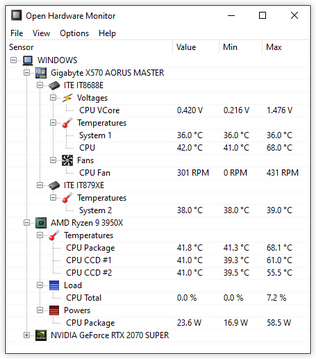- Improved the AMD family 17h (Ryzen) CPU support.
- Additional minor bug fixes.

The Open Hardware Monitor is a free open source software that monitors temperature sensors, fan speeds, voltages, load and clock speeds of a computer.
The Open Hardware Monitor supports most hardware monitoring chips found on todays mainboards. The CPU temperature can be monitored by reading the core temperature sensors of Intel and AMD processors. The sensors of ATI and Nvidia video cards as well as SMART hard drive temperature can be displayed. The monitored values can be displayed in the main window, in a customizable desktop gadget, or in the system tray. The free Open Hardware Monitor software runs on 32-bit and 64-bit Microsoft Windows XP / Vista / 7 / 8 / 8.1 / 10 and any x86 based Linux operating systems without installation.
Latest News
Release Version 0.9.1
Release Version 0.9.0
- Added AMD family 17h (Ryzen) CPU support.
- Added AMD family 16h model 30h (Puma) APU support.
- Added support for Intel CPUs with Goldmont, Goldmont Plus, Cannon Lake, Ice Lake, Tremont and Tiger Lake microarchitecture.
- Added support for Nuvoton NCT6792D, NCT6792D-A, NCT6793D, NCT6795D, NCT6796D, NCT6796D-R, NCT6797D and NCT6798D super I/O chips.
- Added support for ITE IT8655E, IT8665E, IT8686E, IT8688E and IT8792E/IT8795E super I/O chips.
- Added support for secondary ITE super I/O chips.
- Added support for the Fintek F71878AD super I/O chip.
- Added support for the ADL OverDrive6 and OverDrive Next APIs to read AMD GPU sensors.
- Added support for power and PCIE throughput sensors on NVIDIA GPUs (NVML).
- Improved the NVIDIA GPU sensor reading by extending the NVAPI support.
- Added specific configurations for the following Gigabyte mainboards: Z390 M Gaming, Z390 AORUS ULTRA, Z390 UD and X570 AORUS MASTER.
- Updated the mainboard manufacturer identification table.
- Improved the Intel and Micron/Crucial SSD SMART attributes interpretation.
- Fixed an issue with abandoned ISABus mutex locks.
- Additional minor bug fixes.
Release Version 0.8.0 Beta
- Added support for Intel Skylake, Kaby Lake and Airmont CPUs.
- Added support for Intel Xeon E5-26xx v4 and Xeon D-15xx CPUs.
- Added support for Intel Intel i5, i7 5xxC (14nm) CPUs.
- Added support for AMD family 15h model 30h APUs.
- Added support for ITE IT8620E and IT8628E super I/O chips.
- Added support for Nuvoton NCT6102D/NCT6106D super I/O chips.
- Added more Nvidia RAM sensors (free, used and total).
- Added more sensors for Samsung and Plextor SSDs.
- Replaced the ‘Temperature Difference From 100’ with a simple ‘Temperature’ sensor on hard drives.
- Fixed wrong Nvidia GPU clock min and plotting values.
- Fixed issues with Nuvoton NCT6791D super I/O chips after wake from S3 sleep state.
- Fixed incorrect OS version showing up in reports for Windows 10 and 8.1.
- Added customizable pen colors for the plot window.
- Improved the automatic plot pen color assignment strategy.
Release Version 0.7.1 Beta
- Added support for the Nuvoton NCT6791D super I/O chip.
- Added support for Intel Core i7 4xxx CPUs.
- Added support for Intel Core i7-59xx and Xeon E5-2600/1600 v3 CPUs.
- Added support for Intel Core M-5xxx CPUs.
- Added support for Intel Atom N2xxx, D2xxx, C2xxx, E3xxx and Z3xxx CPUs.
- Added support for up to 64 logical processors.
- Added a data logging implementation with configurable logging interval.
- Changed the Intel core temperature reading to evaluate the “reading valid” bit for package level sensors as well.
- Fixed an issue with restoring default control of GPU fans.
- Changed the settings save code to use a more robust two file based approach.
Release Version 0.6.0 Beta
- Added a new plotting implementation using a .NET 2.0 backport of the OxyPlot library. All types of sensors can now be added to the plot. The plot can be configured to use stacked axes instead of subplots for each sensor type. The plot supports automatic or manual plot region selection.
- Added support for Intel Haswell CPUs.
- Added support for AMD family 15h model 1Xh and family 16h CPUs.
- Added support for the Fintek F71869A (F71868AD) super I/O chip.
- Added support for new Samsung SSDs (like Samsung SSD 840 PRO).
- Added support for fan control on ITE 87XX chips and a mainboard specific configuration for the Gigabyte GA 970A UD3 (both based on a patch from Eric Hokanson).
- Changed the HDD detection to list hard drives without SMART support as well.
- Enabled fan control on mainboards by default.
- Improved the kernel driver loading code.
- Added additional information from the SMBIOS to the report.
- Fixed some stability issues in the remote web server implementation.
- Fixed a stability issue in the WMI provider implementation.
- Extended the list of supported super I/O chips on Linux using the lm-sensors interface.
- Reduced the amount of dynamic memory allocation.